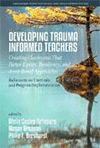
Developing Trauma-Informed Teachers
Creating Classrooms that Foster Equity, Resiliency, and Asset-Based Approaches: Reflections on Curricula and Program Implementation
Edited by:
Ofelia Schepers, Purdue University
Megan Brennan, Resilient Futures
Philip E. Bernhardt, Metropolitan State University of Denver
A volume in the series: Contemporary Perspectives on Developing Trauma-Informed Teachers. Editor(s): Ofelia Schepers, Purdue University. Megan Brennan, Resilient Futures. Philip E. Bernhardt, Metropolitan State University of Denver.
Published 2022
Trauma is a public health crisis. High rates of trauma exposure among youth and the impact that experiences of trauma can have on students’ psychosocial and academic outcomes are well-established. These traumatic events do not live outside of the scope of schools and teaching. As children and teachers develop communities within their classrooms and schools, trauma comes with those who have experienced it, whether invited or not (Bien & Dutro, 2014). This extended time that teachers spend with students inherently provides opportunity to witness students’ lived experiences (Caringi et al., 2015; Motta, 2012). These experiences capture many facets of students’ lives, including traumatic events; however, many teachers indicate that they feel unprepared to address students who have experienced trauma in meaningful and sustainable ways (Caringi et al, 2015). In response, many schools and districts have adopted trauma-informed practices (Overstreet & Chafouleas, 2016).
This text addresses the gap in the literature in embedding trauma-informed practices into pre-service teacher education. This text provides examples of the various ways educator preparation faculty are developing and implementing trauma-informed practices across their programs, instituting broader curricular shifts to incorporate trauma-informed practices, shifting pedagogical practices to include trauma-informed practices and collaborating across disciplines in order to ensure that teacher candidates are thoughtfully prepared to address students’ needs and create classroom environments that are equitable, safe and sustainable for students and teachers.
CONTENTS
Foreword, Joyce Dorado and Martha Merchant. Introduction. Our Stories Belong Here, Ellie Haberl Foster. Embedding Trauma-Informed Practices in Early Childhood and Elementary Teacher Education Courses, Ingrid Carter and Dorothy Shapland. Putting the Pieces Together: Developing a Trauma-Informed Care Classroom, Tamarine Foreman and Perianne Bates. Trauma-Informed Teacher Education: Blending Restorative Practices, Classroom Community, and Standards for Social and Emotional Learning, Romena M. Garrett Holbert and Amber Boddie. Preparing Preservice Teachers to Develop Elementary Students’ Resiliency Through Empathy, Writing, and Diverse Picture Books, Tracey S. Hodges and Holly Hilboldt Swain. The TIP of the Iceberg: Trauma-Informed Practices in Education, Shirley Huisman, Amanda Stefanski, Jenny Johansson, and Jennifer Dollar. Improving the Use of Social Emotional Learning and Trauma-Informed Practices in Teacher Education, Megan N. Lyons, Nigel P. Pierce, and Freda Hicks. Authentic Collaboration in Special Education Teacher Preparation Programs Creates Trauma-Informed Teaching Professionals, Tara Mason. Preparing Preservice Teachers for Complex Emergencies: Learning From Traumatic Events in New Zealand, Carol Mutch, Sophie Peung, and Rori Baird. How a Small, Liberal Arts University Seeks to Create Socially Conscious, Resilient Teachers, Michele M. Nobel. Trauma-Informed Practices in Early Childhood Education: Preparing Those Who Care for Our Youngest Learners, Megan L. Purcell and Karen Ruprecht. Interdisciplinary Personnel Preparation and Positive Change in Trauma-Informed Policy and Practice, Mary Schuh, David Hagner, JoAnne Malloy, Stacy Champey, Theresa Georges, and Stacey Cooper-Jennings. An Excellent TIP for Everyone: Broadening Trauma-Informed Practice With Life-Worlds Pedagogy, Brenda Seals and Greg Seals. Integrating Trauma-Informed Teaching Practices Throughout an Early Childhood Education Program to Support Teacher Education Students, Dorothy Shapland, Rosemarie Allen, Stacy Cook-LaPointe, and Elmer Harris.Lynne Truelove and Mark Boylan. Incorporating Trauma-Informed Practices Into One Teacher Education Program: Convenience, Intentionality, and Institutionalization, Kathryn Young, Ofelia Castro Schepers, and Anna Joseph. About the Editors. About the Contributors.
-
Paperback978-1-64802-992-9
Web price: $45.04 (Reg. 52.99)
-
Hardcover978-1-64802-993-6
Web price: $80.74 (Reg. 94.99)
- eBook978-1-64802-994-3

- EDU049000 - EDUCATION: Behavioral Management
- EDU055000 - EDUCATION: Violence & Harassment
- EDU038000 - EDUCATION: Student Life & Student Affairs
-
 Affirming Identity, Advancing Belonging, and Amplifying Voice in Sororities and Fraternities
Affirming Identity, Advancing Belonging, and Amplifying Voice in Sororities and Fraternities
-
 Creating New Possibilities for the Future of HBCUs
From Research to Praxis
Creating New Possibilities for the Future of HBCUs
From Research to Praxis
-
 Developing Trauma-Informed Teachers
Intentional Partnerships to Create Classrooms that Foster Equity, Resiliency, and Asset-Based Approaches
Developing Trauma-Informed Teachers
Intentional Partnerships to Create Classrooms that Foster Equity, Resiliency, and Asset-Based Approaches
-
 Developing Trauma-Informed Teachers
Creating Classrooms That Foster Equity, Resiliency, and Asset-Based Approaches ~ Research Findings From the Field
Developing Trauma-Informed Teachers
Creating Classrooms That Foster Equity, Resiliency, and Asset-Based Approaches ~ Research Findings From the Field
-
 Learning to Hide
The English Learning Classroom as Sanctuary and Trap
Learning to Hide
The English Learning Classroom as Sanctuary and Trap
-
 Special Education During the Pandemic
Considerations for Change in Practice
Special Education During the Pandemic
Considerations for Change in Practice
-
 What Comes After Lunch?
Alternative Measures of Economic and Social Disadvantage and Their Implications for Education Research
What Comes After Lunch?
Alternative Measures of Economic and Social Disadvantage and Their Implications for Education Research

